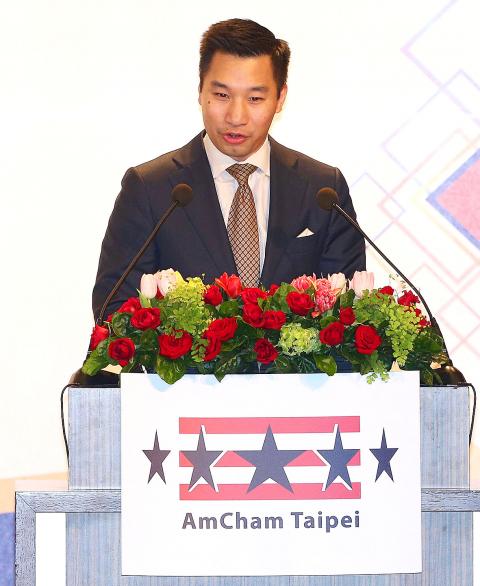A US official on Thursday expressed concern over attempts by China to change the “status quo” across the Taiwan Strait, as seen in Beijing’s escalating efforts to suppress Taiwan internationally.
US Department of State Bureau of East Asian and Pacific Affairs Deputy Assistant Secretary Alex Wong (黃之瀚) pointed to recent actions taken by China to squeeze Taiwan’s international space to make contributions that benefit the international community, such as offering humanitarian assistance and taking part in the World Health Assembly.
“Stability in the region is dependent on the status quo across the Strait. So the US government is very concerned about any attempts to disturb that status quo,” Wong said during a discussion on US strategic competition in the Indo-Pacific region held as part of the annual conference of the Center for a New American Security.

Photo: CNA
Beyond the Taiwan Relations Act, the three US-China communiques and Washington’s “one China” policy, the basis of the US-Taiwan relationship is shared values, a commitment to democracy, a commitment to market economics and a commitment to making positive contributions to the international system, Wong said.
“So in that respect, Taiwan plays a very strong and important role in the Pacific because it’s embodied in the type of reform, the type of value, that we want to promote throughout the Pacific and throughout the world,” he said.
He also mentioned the new office building of the American Institute in Taiwan, which he said is a demonstration of the “enduring nature of our relationship.”
US Principal Assistant Secretary of Defense for Asian and Pacific Security Affairs David Helvey said that Taiwan is a critically important partner of the US and that Washington continues to make available to Taiwan defense articles and services necessary to maintain its self-defense.
Taiwan’s role in the Indo-Pacific region strategy lies in its ability to maintain investment in its own capability to maintain the right type of deterrence and balance across the Taiwan Strait, so it can interact with China in a way that is consistent with its overall approach toward the cross-strait relationship, he said.

US President Donald Trump yesterday announced sweeping "reciprocal tariffs" on US trading partners, including a 32 percent tax on goods from Taiwan that is set to take effect on Wednesday. At a Rose Garden event, Trump declared a 10 percent baseline tax on imports from all countries, with the White House saying it would take effect on Saturday. Countries with larger trade surpluses with the US would face higher duties beginning on Wednesday, including Taiwan (32 percent), China (34 percent), Japan (24 percent), South Korea (25 percent), Vietnam (46 percent) and Thailand (36 percent). Canada and Mexico, the two largest US trading

AIR SUPPORT: The Ministry of National Defense thanked the US for the delivery, adding that it was an indicator of the White House’s commitment to the Taiwan Relations Act Deputy Minister of National Defense Po Horng-huei (柏鴻輝) and Representative to the US Alexander Yui on Friday attended a delivery ceremony for the first of Taiwan’s long-awaited 66 F-16C/D Block 70 jets at a Lockheed Martin Corp factory in Greenville, South Carolina. “We are so proud to be the global home of the F-16 and to support Taiwan’s air defense capabilities,” US Representative William Timmons wrote on X, alongside a photograph of Taiwanese and US officials at the event. The F-16C/D Block 70 jets Taiwan ordered have the same capabilities as aircraft that had been upgraded to F-16Vs. The batch of Lockheed Martin

China's military today said it began joint army, navy and rocket force exercises around Taiwan to "serve as a stern warning and powerful deterrent against Taiwanese independence," calling President William Lai (賴清德) a "parasite." The exercises come after Lai called Beijing a "foreign hostile force" last month. More than 10 Chinese military ships approached close to Taiwan's 24 nautical mile (44.4km) contiguous zone this morning and Taiwan sent its own warships to respond, two senior Taiwanese officials said. Taiwan has not yet detected any live fire by the Chinese military so far, one of the officials said. The drills took place after US Secretary

CHIP EXCEPTION: An official said that an exception for Taiwanese semiconductors would have a limited effect, as most are packaged in third nations before being sold The Executive Yuan yesterday decried US President Donald Trump’s 32 percent tariff on Taiwanese goods announced hours earlier as “unfair,” saying it would lodge a representation with Washington. The Cabinet in a statement described the pledged US tariffs, expected to take effect on Wednesday next week, as “deeply unreasonable” and “highly regrettable.” Cabinet spokeswoman Michelle Lee (李慧芝) said that the government would “lodge a solemn representation” with the US Trade Representative and continue negotiating with Washington to “ensure the interests of our nation and industries.” Trump at a news conference in Washington on Wednesday announced a 10 percent baseline tariff on most goods